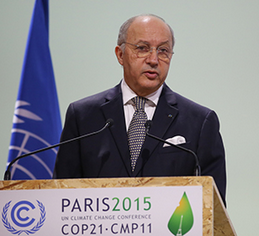Describing the outcome of the tedious, multi-year negotiation process leading to the adoption of the Paris Agreement as "the most balanced, comprehensive and ambitious result that we could hope to achieve," Laurent Fabius, President of the 21st session of the Conference of the Paris (COP 21) to the UNFCCC, emphasized that "our collective focus must move to implementation." For their efforts toward this outcome, Fabius and UNFCCC Executive Secretary Christiana Figueres are the 2016 awardees of the Ewald von Kleist Award.
 11 February 2016: Describing the outcome of the tedious, multi-year negotiation process leading to the adoption of the Paris Agreement as “the most balanced, comprehensive and ambitious result that we could hope to achieve,” Laurent Fabius, President of the 21st session of the Conference of the Paris (COP 21) to the UNFCCC, emphasized that “our collective focus must move to implementation.” For their efforts toward this outcome, Fabius and UNFCCC Executive Secretary Christiana Figueres are the 2016 awardees of the Ewald von Kleist Award.
11 February 2016: Describing the outcome of the tedious, multi-year negotiation process leading to the adoption of the Paris Agreement as “the most balanced, comprehensive and ambitious result that we could hope to achieve,” Laurent Fabius, President of the 21st session of the Conference of the Paris (COP 21) to the UNFCCC, emphasized that “our collective focus must move to implementation.” For their efforts toward this outcome, Fabius and UNFCCC Executive Secretary Christiana Figueres are the 2016 awardees of the Ewald von Kleist Award.
Fabius delivered his remarks during the 11 February 2016 meeting of the COP 21 Bureau. He gave credit to Parties for their intense work to ensure collective ownership of the Agreement, saying that transparency, trust and strong political will fueled the outcome, making it a victory for the UNFCCC process and multilateralism. He also credited an alignment of the stars last year, including: the strong climate impacts felt in 2015; the clear climate science consensus; the promising prospects of low-carbon, resilient development; universal commitment to climate action from various actors; and the spirit of compromise.
Looking forward to 2016, he called on countries to prepare to implement their intended nationally determined contributions (INDCs) by turning them into actual public policies and programmes and assisting developing countries in their efforts to do so. For sectors not covered by the Paris Agreement, including air and maritime transport and hydrofluorocarbons (HFCs), he urged countries engaged in multilateral negotiations in these areas to meet or exceed the ambition of the Paris Agreement.
Within the UNFCCC process, he outlined that much works remains: “signing and ratifying the agreement, so that it can come into force as soon as possible; preparing the implementing decisions of the agreement; maximizing pre-2020 action by all; and demonstrating, in Marrakech, that we have truly entered a new era of global cooperation of climate change.” COP 22 will be held from 7-18 November 2016, in Marrakech, Morocco, where, Fabius added, “We cannot give the impression that Paris was an accident, and return to negotiations-as-usual. France and Morocco will work hand-in-hand to ensure that this is not the case.” He called on the Subsidiary Bodies of the Convention, the Ad Hoc Working Group on the Paris Agreement (APA), and the constituted bodies for support in this effort.
Fabius and Figueres were honored by the 52nd Munich Security Conference, on 13 February 2016, with the Ewald von Kleist Award for their role in shepherding the UNFCCC negotiations on the Paris Agreement to a successful conclusion. The Paris Agreement was adopted on 12 December 2015, at the Paris Climate Change Conference. According to the Award sponsors, “Figueres and Fabius have reached a landmark success in international climate diplomacy,” noting that “climate policy is an integral part of far-sighted security policy and has a substantial influence on global security and stability.” The award recognizes public figures for contributing to international peace and conflict resolution.
In preparing for the Paris Agreement to enter into force the APA and Subsidiary Bodies will take up a number of agenda items mandated by Decision 1/CP.21 accompanying the Paris Agreement. The first meeting of the APA will take place during the 44th session of the Subsidiary Bodies, scheduled for 16-26 May 2016, in Bonn, Germany. The COP Bureau advises the President and assists in the management of the intergovernmental climate change process. Its makeup represents the five UN regional groups and small island developing States (SIDS). [UNFCCC Press Release] [Excerpts from COP 21/CMP 11 President Remarks] [Munich Security Conference Press Release] [IISD RS Coverage of Paris Climate Change Conference]